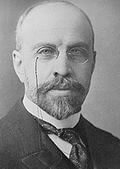the Third Week after Easter
Click to donate today!
Bible Commentaries
Gray's Concise Bible Commentary Gray's Concise Commentary
Old Testament
New Testament
James Martin Gray (1851-1935) was a distinguished American pastor, Bible scholar, and hymn writer, renowned for his deep commitment to the Christian faith and for his significant contributions to evangelical scholarship. Born in New York City, Gray's spiritual journey commenced in his youth, leading him to a profound personal faith in Jesus Christ. His dedication to the scriptures and Christian ministry was evident through his prolific career, marked by his leadership roles and scholarly endeavors.
Gray's academic journey was characterized by rigorous study and a passion for understanding the Bible. He served as the president of the Moody Bible Institute in Chicago, a position he held from 1904 to 1934, where he significantly influenced the institution's development and its commitment to biblical inerrancy and dispensational premillennialism. Under his leadership, the institute became a beacon for evangelical education, emphasizing the importance of the Bible as the foundation of faith and practice.
As an author, Gray penned numerous works on biblical interpretation and Christian living, making complex theological concepts accessible to laypeople. His writings continue to inspire and educate readers on the richness of biblical teachings. Gray's approach to scripture was both scholarly and devotional, encouraging a holistic engagement with God's word.
Furthermore, James M. Gray's contribution to Christian hymnody is notable, with hymns that have enriched worship and articulated the hopes and faith of believers. His hymns, characterized by their doctrinal depth and poetic beauty, remain a testament to his artistic and spiritual legacy.
Gray's life and work exemplify a profound dedication to Christian education and the spiritual nourishment of the evangelical community. His legacy lives on through his writings, hymns, and the ongoing influence of the Moody Bible Institute, cementing his status as a pivotal figure in American evangelicalism. James M. Gray's devotion to God, his scholarly acumen, and his leadership in Christian education have left an indelible mark on the landscape of American Christianity, inspiring generations of believers to deepen their understanding of the Bible and to live out their faith with conviction and grace.
